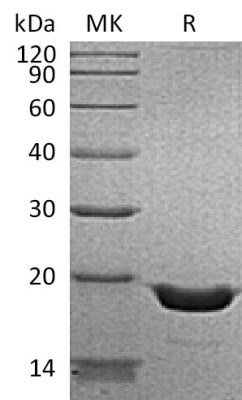| TARGET | |
|---|---|
| SYNONYMS |
Tumor Necrosis Factor;Cachectin;TNF-Alpha;Tumor Necrosis Factor Ligand Superfamily Member 2;TNF-a;TNF;TNFA;TNFSF2 |
| DESCRIPTION |
Recombinant Human Tumor Necrosis Factor Alpha is produced by our E.coli expression system and the target gene encoding Gly57-Leu233 is expressed with a 6His tag at the N-terminus. |
| DELIVERY |
In Stock |
| UNIPROT ID |
P01375 |
| EXPRESSION HOST |
E.coli |
| TAG |
C-6×His Tag |
| MOLECULAR CHARACTERIZATION |
Not available |
| MOLECULAR WEIGHT |
21.8 KDa |
| PURITY |
Greater than 95% as determined by reducing SDS-PAGE. |
| FORMULATION & RECONSTITUTION |
Lyophilized from a 0.2 μm filtered solution of 20mM PB, 100mM NaCl, pH 8.0. |
| STORAGE & SHIPPING |
Store at -20°C to -80°C for 12 months in lyophilized form. After reconstitution, if not intended for use within a month, aliquot and store at -80°C (Avoid repeated freezing and thawing). Lyophilized proteins are shipped at ambient temperature. |
| BACKGROUND |
Tumor Necrosis Factor-a (TNF-a) is secreted by macrophages, monocytes, neutrophils, T-cells, and NK-cells following stimulation by bacterial LPS. Cells expressing CD4 secrete TNF-a while cells that express CD8 secrete little or no TNF-a. Synthesis of TNF-a can be induced by many different stimuli including interferons, IL2, and GM-CSF. The clinical use of the potent anti-tumor activity of TNF-a has been limited by the proinflammatory side effects such as fever, dose-limiting hypotension, hepatotoxicity, intravascular thrombosis, and hemorrhage. Designing clinically applicable TNF-a mutants with low systemic toxicity has been of intense pharmacological interest. Human TNF-a that binds to murine TNF-R55 but not murine TNF-R7, exhibits retained anti-tumor activity and reduced systemic toxicity in mice compared with murine TNF-a, which binds to both murine TNF receptors. Based on these results, many TNF-a mutants that selectively bind to TNF-R55 have been designed. These mutants displayed cytotoxic activities on tumor cell lines in vitro and have exhibited lower systemic toxicity in vivo. Recombinant Human TNF-a High Active Mutant differs from the wild-type by amino acid subsitution of amino acids 1-7 with Arg8, Lys9, Arg10 and Phe157. This mutant form has been shown to have increased activity with less inflammatory side effects in vivo. |
| USAGE |
Research use only |
1
/
의
1
Dima Biotech
SKU(재고 관리 코드):PME30019
Human TNF alpha (N-6His) Protein
Human TNF alpha (N-6His) Protein
PRODUCT DATA
IMAGES

Figure 1. Greater than 95% as determined by reducing SDS-PAGE.


